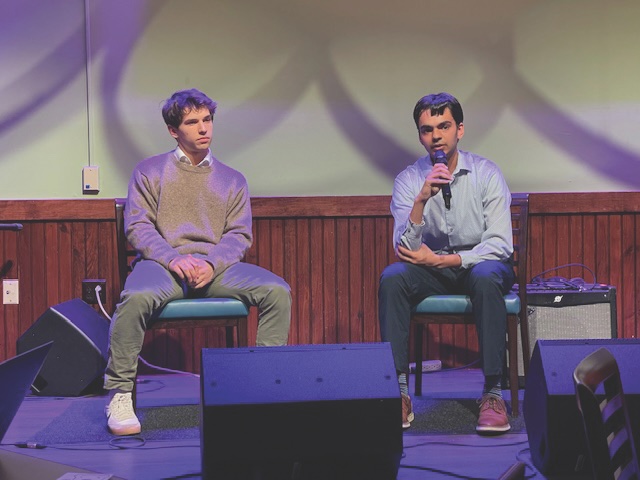BSG presidential, vice presidential debates focus on improving connections with the student body
April 5, 2024
 Andy Robinson
Andy RobinsonPresidential and vice presidential candidates for Bowdoin Student Government (BSG) gathered at Jack Magee’s Pub on Wednesday night to discuss their policy proposals and readiness to confront institutional challenges on campus. The elections for both roles open today and close at 8 p.m. on Sunday.
Candidates for vice president, Elliott Ewell ’27 and Khush Patel ’27, spoke first, followed by presidential candidates Eisa Rafat ’25 and Eman Okyere ’25. Questions were moderated by Julia Dickinson ’26 and Catalina Escobedo ’26 of the Bowdoin Orient.
Both presidential candidates emphasized their experience on BSG and within other student-led organizations. When asked about what they would change as president, both Rafat and Okyere highlighted the importance of increasing BSG’s visibility on campus and interacting more with the student body.
“I think BSG members, not just including myself, but the general assembly, could do a better job of getting out into campus life,” Rafat said. “I think we’ve built a really good team, and we’ve built a really good community of people that are really willing to use this momentum that we’ve built in the last year and bring it out.”
Okyere placed a high priority on increasing cohesion within BSG to ensure that all students, both inside and outside the organization, feel comfortable making their voices heard.
“I think the lack of institutional knowledge is something that we still have to work on,” Okyere said. “Executives who lead their own committees need to know what exactly they’re doing and … also [understand] the goals [of their positions].… I think if those leaders don’t know what they’re doing, then we’re going to have a very hard time trying to get things done efficiently.”
Okyere also emphasized the importance of encouraging students to embrace failure, both on a social and academic level, and cited his work on the previous mental health forums hosted by BSG since Okyere’s first year.
Rafat described his involvement and advocacy in organizations like the Muslim Students Association and the Center for Multicultural Life. Rafat said this shaped his ability to understand different parts of campus, both on the administrative and student level.
“When I first got to Bowdoin, there weren’t a lot of accommodations that existed for Muslim students on campus. Specifically working with the Muslim Student Alliance, I worked very closely with administrators to get these accommodations set.… This took years of conversation with the administration, which is something I’m very familiar with,” Rafat said.
In the vice presidential debate, Ewell and Patel both discussed increasing opportunities for students outside BSG to engage in its activities. Ewell emphasized the need for BSG-led office hours, and Patel noted the current lack of student involvement.
“My campaign is focused on transparency and increased participation,” Patel said. “[At] the first informational meeting for the student government in the fall, I noticed that there was a lack of student involvement.… We really need to focus on being able to include all voices in student government, not just those that are elected or those that apply and get a position.”
When asked about his plans for making BSG more accessible, Ewell discussed his prior involvement in BSG, including his work developing the new BSG website and updating BSG’s communications branding.
In both of their respective debates, Rafat and Ewell emphasized the importance of bringing back a shuttle service between Bowdoin and the Portland International Jetport for students traveling to and from home.
“It’s really important that students have safe and affordable transport,” Rafat said. “There’s been some stories of students that felt unsafe getting in cabs and coming back in the really late hours, so it’s not just this idea centered around students not being able to or having more affordable options.… This was a service that existed before, so my hope is to bring it back and bring it back quickly.”
Abigail Martin ’26, BSG’s academic affairs executive leader, praised the debate for raising student attention to the important work of BSG.
“It’s good to see that people who are coming into BSG now are really passionate. They’re doing a lot of good work,” Martin said.
Julia Dickinson and Catalina Escobedo are members of the Bowdoin Orient.

Comments
Before submitting a comment, please review our comment policy. Some key points from the policy: